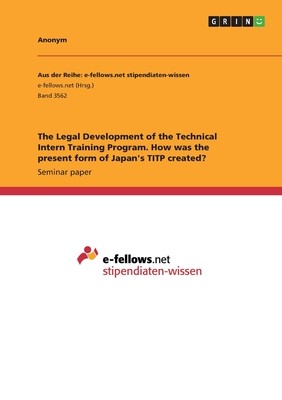
- We will send in 10–14 business days.
- Author: Anonym
- Publisher: GRIN Verlag
- Year: 2020
- Pages: 24
- ISBN-10: 3346240142
- ISBN-13: 9783346240149
- Format: 14.8 x 21 x 0.2 cm, minkšti viršeliai
- Language: English
- SAVE -10% with code: EXTRA
The Legal Development of the Technical Intern Training Program. How was the present form of Japan's TITP created? (e-book) (used book) | bookbook.eu
Reviews
Description
Seminar paper from the year 2018 in the subject Asian studies, grade: 1,7, University of Duisburg-Essen, language: English, abstract: This term paper relates to the legal development of the Technical Intern Training Program (gaikokujin ginō jisshū seido, hereinafter "TITP") and its forerunner programs from roughly 1989 to 2009. In order to seek answers for the research question, the applicability of the Advocacy Coalition Framework (ACF) will be tested. Alongside shrinking population and workforce numbers and an ageing society, Japan experiences major transformation processes. Having only about 1.8 percent of foreign residents yet, the number of participants in the TITP is steadily on the rise. The second chapter "The Advocacy Coalition Framework" deals with the policy process theory called ACF, which was developed in the late 1980s. Chapter three "Historical Evolution of the Technical Intern Program" reconstructs the position of major involved stakeholder and examines legal changes to the Immigration Control and Refugee Recognition Act (Shutsunyūkoku kanri oyobi nanmin nintei hō, hereinafter "Immigration Act") in four separated periods from the description of distant TITP predecessors prior to 1989 to the last reform of the Immigration Act in 2009. In chapter four "Applying the Advocacy Coalition Framework to the evolution of the Japanese Technical Intern Training Program" both prior chapter issues are brought together for an indepth analysis of the Japanese immigration subsystem using the ACF.
EXTRA 10 % discount with code: EXTRA
The promotion ends in 21d.20:16:30
The discount code is valid when purchasing from 10 €. Discounts do not stack.
- Author: Anonym
- Publisher: GRIN Verlag
- Year: 2020
- Pages: 24
- ISBN-10: 3346240142
- ISBN-13: 9783346240149
- Format: 14.8 x 21 x 0.2 cm, minkšti viršeliai
- Language: English English
Seminar paper from the year 2018 in the subject Asian studies, grade: 1,7, University of Duisburg-Essen, language: English, abstract: This term paper relates to the legal development of the Technical Intern Training Program (gaikokujin ginō jisshū seido, hereinafter "TITP") and its forerunner programs from roughly 1989 to 2009. In order to seek answers for the research question, the applicability of the Advocacy Coalition Framework (ACF) will be tested. Alongside shrinking population and workforce numbers and an ageing society, Japan experiences major transformation processes. Having only about 1.8 percent of foreign residents yet, the number of participants in the TITP is steadily on the rise. The second chapter "The Advocacy Coalition Framework" deals with the policy process theory called ACF, which was developed in the late 1980s. Chapter three "Historical Evolution of the Technical Intern Program" reconstructs the position of major involved stakeholder and examines legal changes to the Immigration Control and Refugee Recognition Act (Shutsunyūkoku kanri oyobi nanmin nintei hō, hereinafter "Immigration Act") in four separated periods from the description of distant TITP predecessors prior to 1989 to the last reform of the Immigration Act in 2009. In chapter four "Applying the Advocacy Coalition Framework to the evolution of the Japanese Technical Intern Training Program" both prior chapter issues are brought together for an indepth analysis of the Japanese immigration subsystem using the ACF.


Reviews